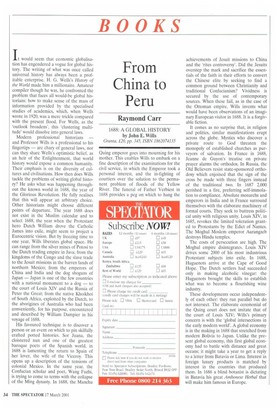From China to Peru
Raymond Carr
1688: A GLOBAL HISTORY by John E. Wills Granta, £20, pp. 345, ISBN 1862074135 It would seem that economic globalisation has engendered a vogue for global history. The writing of what was once called universal history has always been a profitable enterprise. H. G. Wells's History of the World made him a millionaire. Amateur compiler though he was, he confronted the problem that faces all would-be global historians: how to make sense of the mass of information provided by the specialised studies of academics, which, when Wells wrote in 1920, was a mere trickle compared with the present flood. For Wells, as the 'outlook broadens', this 'clustering multitude' would dissolve into general laws.
Modern professional historians — and Professor Wills is a professional to his fingertips — are chary of general laws, nor can they share Wells's optimistic belief, as an heir of the Enlightenment, that world history would expose a common humanity. Their emphasis is on the diversity of cultures and civilisations. How then does Wills tackle the problems of writing global history? He asks what was happening throughout the known world in 1688, the year of the Glorious Revolution. He fully realises that this will appear an arbitrary choice. Other historians might choose different points of departure. The year 1688 does not exist in the Muslim calendar and to select 1688, the year when the Protestant hero Dutch William drove the Catholic James into exile, might seem to project a Eurocentric vision. But by freezing time to one year, Wills liberates global space. He can range from the silver mines of Potosi to the Dutch trading empire in Java; from the kingdoms of the Congo and the slave trade to the Jesuit missions in the barren lands of northern Mexico; from the emperors of China and India and the dog shoguns of Japan — Japan is one of the few countries with a national monument to a dog — to the court of Louis XIV and the Russia of Peter the Great; from the native Khoikhoi of South Africa, exploited by the Dutch, to the aborigines of Australia who had been conveniently, for his purpose, encountered and described by William Dampier in his voyage of 1688.
His favoured technique is to discover a person or an event on which to pin skilfully crafted potted histories. Sor Juana, the cloistered nun and one of the greatest baroque poets of the Spanish world, in 1688 is lamenting the return to Spain of her lover, the wife of the Viceroy. This opens up a description of the tensions of colonial Mexico. In the same year, the Confucian scholar and poet, Wang Fuzhi, is trying to come to terms with the collapse of the Ming dynasty. In 1688, the Manchu Quing emperor goes into mourning for his mother. This enables Wills to embark on a fine description of the examinations for the civil service, in which the Emperor took a personal interest, and the in-fighting of courtiers over the solution to the permanent problem of floods of the Yellow River. The funeral of Father Verbiest in 1688 provides a peg on which to hang the achievements of Jesuit missions to China and the 'rites controversy'. Did the Jesuits overstep the mark and sacrifice the essentials of the faith in their efforts to convert the Chinese elite by seeking to find a common ground between Christianity and traditional Confucianism? Vividness is secured by the use of contemporary sources. When these fail, as in the case of the Ottoman empire, Wills invents what would have been observations of an imaginary European visitor in 1688. It is a forgivable fiction.
It comes as no surprise that, in religion and politics, similar manifestations erupt across the globe. Mystics who discover a private route to God threaten the monopoly of established churches as purveyors of salvation. In France in 1688, Jeanne de Guyon's treatise on private prayer alarms the orthodox. In Russia, the Old Believers resist state-sponsored orthodoxy which enjoined that the sign of the cross be made with three fingers instead of the traditional two. In 1687 2,000 perished in a fire, preferring self-immolation to compliance. Absolute monarchs and emperors in India and in France surround themselves with the elaborate machinery of formal courts. They seek to buttress political unity with religious unity. Louis XIV, in 1685, revokes the limited toleration granted to Protestants by the Edict of Nantes. The Moghul Moslem emperor Aurangzeb destroys Hindu temples.
The costs of persecution are high. The Moghul empire disintegrates. Louis XIV drives some 2000 of his most industrious Protestant subjects into exile. In 1688, Huguenots arrive at the Cape of Good Hope. The Dutch settlers had succeeded only in making alcoholic vinegar: the Huguenots brought the skills to establish what was to become a flourishing wine industry.
These developments occur independently of each other: they run parallel but do not intersect. The elaborate ceremonial of the Quing court does not imitate that of the court of Louis XIV; Wills's primary concern is with the 'global intersections in the early modern world'. A global economy is in the making in 1688 that stretched from modern Bolivia to Japan. Unlike the present global economy, this first global economy had to battle with distance and great oceans; it might take a year to get a reply to a letter from Batavia or Lima. Interest in foreign luxury products is matched by interest in the countries that produced them. In 1686 a blind botanist is dictating in Batavia his great Ambonese Herbal that will make him famous in Europe.
The Jesuits were not merely missionaries. They can be seen as the first international organisation of social scientists. It was the information they provided that awoke European interest in China. The West did not know what to make of Chinese civilisation. The Chinese were clearly not Dampier's savages, nor were they like Moslems who revered Abraham and for whom Christ was one of the prophets. Leibniz was not only an admirable philosopher, he studied Confucius. But it is in the West that a Republic of Letters flourished. In Carinthia an obscure nobleman and natural scientist is sending his reports on the phenomena of Lake Cernika to the Royal Society in London. In 1688 Newton overcame his paranoia to publish his Principal, 'one of the few books that have really changed how we see the world', while Locke was publishing the works that would make him a founding father of liberalism. A century later, American patriots were to claim for themselves the 'liberties' which Locke had demanded for Englishmen. In this sense 1688 has a global significance.
It is relatively easy to write long books, and global historians tend to be selfindulgent. The test of a good historian is the capacity to compress, and Wills is a master of compression. It is a historiographical miracle that he compresses the history of the globe in some 300 pages without sacrificing the details, fruit of his scholarship, that enliven every page. We are given not merely a readable summary of Locke's philosophy but told of his interest in Friesian sheep. He fulfils the Gibbonian precept: history should both instruct and entertain.



































































 Previous page
Previous page